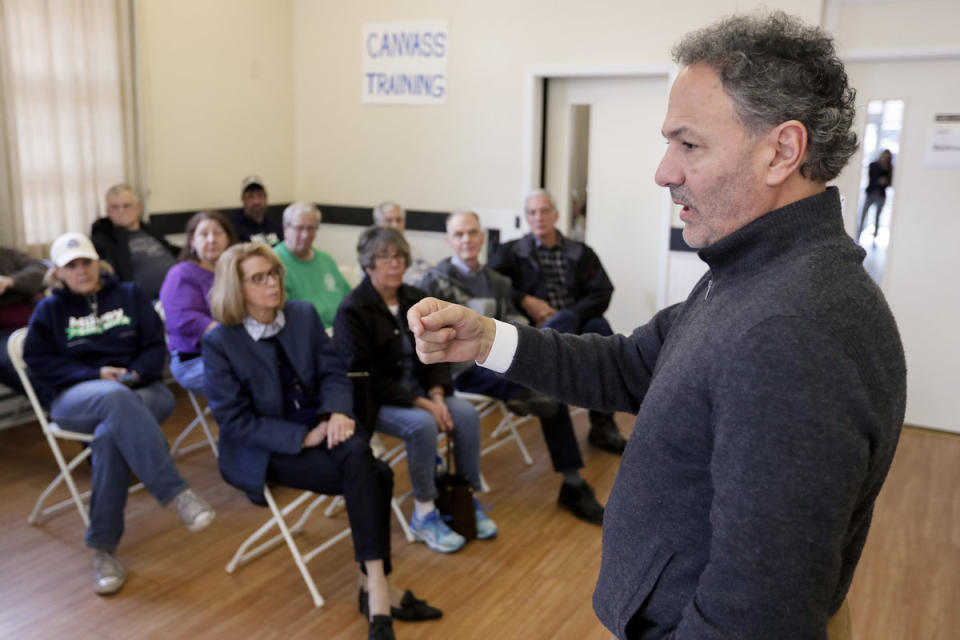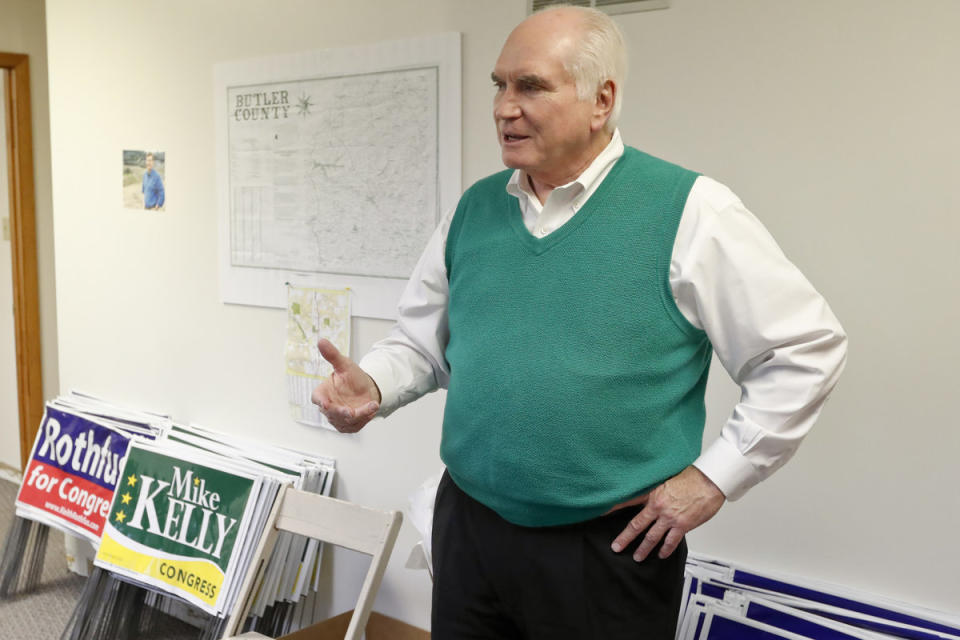A blue wave? These Pa. House races could show if it takes shape
If a Democratic wave takes shape on Election Night, some of the first warning signs could arrive in Harrisburg or Erie County, Pa.
Democrats are targeting two solidly Republican districts in those areas, hoping that a surge could give them a chance in races well outside the typical swing districts. The party’s best chance for a U.S. House majority still runs through suburbs like those around Philadelphia and other big cities. But their shot at a true wave could hinge on difficult exurban and rural races like these.
The district around Harrisburg has given Republicans the most anxiety. Recent polls from the New York Times/Siena College and Susquehanna Polling and Research both found virtual ties between U.S. Rep. Scott Perry (R., Pa.) and his Democratic challenger, George Scott.
“If Scott Perry loses, people better be battening down the hatches elsewhere. It’s going to be a long, wet night,” said Charlie Gerow, a Republican strategist who lives in the district.
One poll out this week even suggested a close contest between U.S. Rep. Lloyd Smucker (R., Pa.) and challenger Jess King in a Lancaster County-based district that President Trump won by nearly 26 percentage points.
By contrast, another dark horse race in the Scranton area could send up a warning sign for Democrats, as Republicans hope to unseat U.S. Rep. Matt Cartwright in a district that swung strongly toward Trump.
The incumbents are still favored in each race, but national analysts give Democrats the better chances of pulling off the upsets.
National groups in both parties have been dropping campaign money into the Harrisburg-based 10th district, and national Democrats are spending in the 16th in Northwestern Pennsylvania, where U.S. Rep. Mike Kelly faces a challenge from Ron DiNicola, a lawyer and former Erie County solicitor.
“I’d keep an eye on both of them, but especially keep an eye on the 10th,” U.S. Rep. Ben Ray Lujan (D., N.M.), chairman of Democrats’ national congressional campaign arm, said in September. Democratic aides said last week that the analysis still stands.
Republicans have taken note. Trump held an Oct. 10 rally on Kelly’s home turf and Vice President Pence flew in last week for events with Perry and John Chrin, Cartwright’s challenger in Northeast Pennsylvania.
Military Backgrounds
Perry has an Army background, but in Scott he now faces a square-jawed pastor who also has military credentials. Scott was an Army lieutenant colonel who served in the Persian Gulf during the first Iraq war and in Kuwait after 9/11. The Democrat drew national attention during the his party primary with an ad showing him disassembling a rifle by hand and dumping it into a fire.
At a campaign stop at York College of Pennsylvania Tuesday, Scott said his background and roots in the area have opened doors in a conservative district.
“I’m a pastor, but I’m running as a citizen,” said Scott. “And what I’ve been surprised is by the number of people who have encouraged me to speak out politically about my faith. I think often times, the Democratic party has shied away from that, and what I’ve heard from a large number of people, including Democrats, is that is part of reason we support you. They see me as a different kind of Democrat.”

Voters, he said, “see in me someone who has their best interests at heart … someone who puts their needs and the needs of our nation above the needs of the party.”
Like many Democrats running in conservative territory, Scott said he would strive for bipartisan solutions, but also said he’s “shocked” by the inability of Republicans in Congress to check Trump, and that it’s a concern he has heard from voters in both parties.
His run has been boosted by new district boundaries drawn by the Supreme Court after it ruled Pennsylvania’s old congressional map was unconstitutional. It’s now a district that supported Trump by 9 percentage points, instead of 22 under the old borders.
Despite that shift to a more moderate composition, Perry, who served in Iraq as an Army helicopter pilot and then in the state legislature, remains a devout conservative who aligns with the far-right House Freedom Caucus. The group’s leader, U.S. Rep. Mark Meadows (R., N.C.) is sending in campaign money to save him.
>> VOTERS GUIDE: View candidates in the 2018 midterm election based on your address, or browse all the action in Pennsylvania, New Jersey, and Delaware
Perry’s campaign did not respond to multiple requests to attend his events.
Several Pennsylvania Republicans, including Gerow, predicted Perry would win. But several groused that the incumbent, who has never had a close call, didn’t take the threat seriously, even when political professionals warned him.
“Until recently, I don’t think the congressman thought he had a race,” said Josh Novotney, a Philadelphia Republican who has previously worked with the party’s House campaign arm. He said national Republicans and Perry “seem to be considering it a real race now, but it will probably be tighter than it should be.”

An Erie County battle
At first glance, Kelly’s district appears to be the bigger stretch for Democrats. Trump won it by 20 percentage points. But the district also narrowly voted for Barack Obama in 2008, giving Democrats some hope.
The Democratic challenger there, DiNicola, is more measured in his stance toward Trump than many in his party. He praised the president for “cracking down on the Chinese” and said his main goal — reforming campaign spending — would further Trump’s pledge to “drain the swamp.”
A former boxer when he was in the Marines, DiNicola said he would support Trump on issues that are helpful to Western Pennsylvania and criticized Kelly for voting in favor of a trade deal with South Korea. (The pact was also backed by 59 House Democrats and signed by then-President Barack Obama in 2011).

“I’m not in a race to critique the president. He came to my district to campaign for my opponent and he graciously did not saddle me with a nickname that I will have for the rest of my life, so I’m pretty good with him so far,” DiNicola said in a telephone interview.
Kelly, however, scoffed at that notion.
“He can say what he wants … Nancy Pelosi will tell him what shirt to wear, what tie to wear,” Kelly said.
Kelly, who ran his family’s car dealership in Butler, Pa. before joining Congress as part of the Tea Party wave, said Trump and the GOP have breathed life into a struggling region.
“Their lives the last 21 months have changed dramatically under this administration,” he said in a telephone interview.
Echoing Trump, he also warned about the caravan of migrants moving through Central America toward the U.S. border, though still some 1,000 miles away, saying Americans should be concerned about people who might “live in their houses and eat their food and use their doctors.”

A Times/Siena poll in early October found Kelly with an eight-percentage point advantage.
If Democrats see hope in those races, though, Northeast Pennsylvania presents a potential stumbling block.
Cartwright’s district swung roughly 22 percentage points from Obama toward Trump, one of the largest rightward shifts in the country. Republicans see a chance to offset expected losses elsewhere.
Independent political analysts, however, rate the race as a “likely” victory for Cartwright, and a mid-October Times/Siena poll found the Democrat with a 12-point lead.
If an upset emerges in any of the races, it could signal which party will end election night smiling.
Staff writer Angela Couloumbis contributed to this report.


